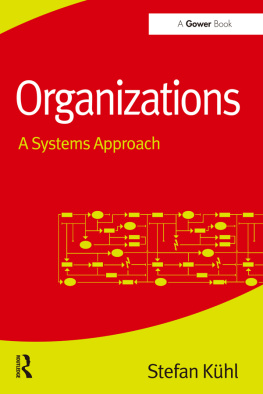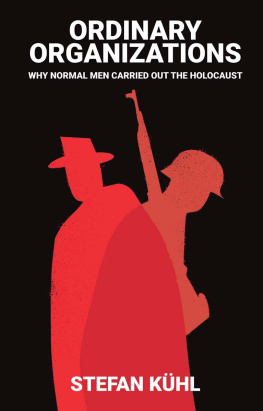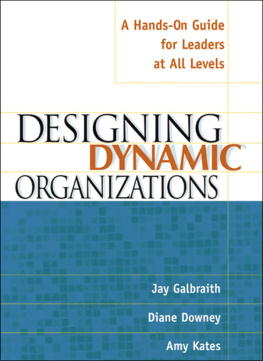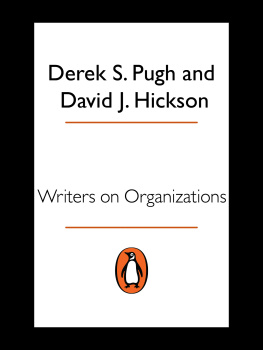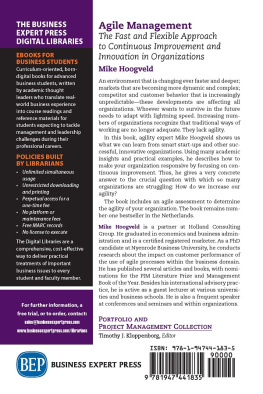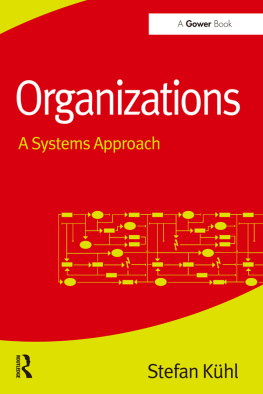Kühl - Organizations: a systems approach
Here you can read online Kühl - Organizations: a systems approach full text of the book (entire story) in english for free. Download pdf and epub, get meaning, cover and reviews about this ebook. City: London, year: 2016, publisher: Taylor and Francis;Routledge, genre: Politics. Description of the work, (preface) as well as reviews are available. Best literature library LitArk.com created for fans of good reading and offers a wide selection of genres:
Romance novel
Science fiction
Adventure
Detective
Science
History
Home and family
Prose
Art
Politics
Computer
Non-fiction
Religion
Business
Children
Humor
Choose a favorite category and find really read worthwhile books. Enjoy immersion in the world of imagination, feel the emotions of the characters or learn something new for yourself, make an fascinating discovery.
Organizations: a systems approach: summary, description and annotation
We offer to read an annotation, description, summary or preface (depends on what the author of the book "Organizations: a systems approach" wrote himself). If you haven't found the necessary information about the book — write in the comments, we will try to find it.
Kühl: author's other books
Who wrote Organizations: a systems approach? Find out the surname, the name of the author of the book and a list of all author's works by series.
Organizations: a systems approach — read online for free the complete book (whole text) full work
Below is the text of the book, divided by pages. System saving the place of the last page read, allows you to conveniently read the book "Organizations: a systems approach" online for free, without having to search again every time where you left off. Put a bookmark, and you can go to the page where you finished reading at any time.
Font size:
Interval:
Bookmark:

A Systems Approach
STEFAN KHL
Translated by
PHILIP SCHMITZ

First published 2013 by Gower Publishing
Published 2016 by Routledge
2 Park Square, Milton Park, Abingdon, Oxon OX14 4RN
711 Third Avenue, New York, NY 10017, USA
Routledge is an imprint of the Taylor & Francis Group, an informa business
copyright Stefan Khl 2013
Stefan Khl has asserted his moral right under the Copyright, Designs and Patents Act, 1988, to be identified as the author of this work.
All rights reserved. No part of this book may be reprinted or reproduced or utilised in any form or by any electronic, mechanical, or other means, now known or hereafter invented, including photocopying and recording, or in any information storage or retrieval system, without permission in writing from the publishers.
Notice:
Product or corporate names may be trademarks or registered trademarks, and are used only for identification and explanation without intent to infringe.
Gower Applied Business Research
Our programme provides leaders, practitioners, scholars and researchers with thought provoking, cutting edge books that combine conceptual insights, interdisciplinary rigour and practical relevance in key areas of business and management.
British Library Cataloguing in Publication Data
A catalogue record for this book is available from the British Library.
Library of Congress Cataloging-in-Publication Data
Khl, Stefan.
Organizations : a systems approach / by Stefan Khl.
pages cm
Includes bibliographical references and index.
ISBN 978-1-4724-1341-3 (pbk) -- ISBN 978-1-4724-1342-0 (ebk) -
ISBN 978-1-4724-1343-7 (epub) 1. Organization. 2. Organizational sociology.
I. Title.
HM711.K84 2013
302.35--dc23
2013020846
ISBN 13: 978-1-4724-1341-3 (pbk)
Stefan Khl studied sociology and historical science at Bielefeld University, Johns Hopkins University in Baltimore, Universit Paris-X-Nanterre, and the University of Oxford. He is a professor of sociology at Bielefeld University and works as an organizational consultant for Metaplan, a consultancy firm based in Princeton, Paris and Hamburg.
Although organizations define our lives to a significant degree, we never receive any training in how to deal with them. After all, no school curriculum in the world offers a course in organizationology. Most courses of study prepare people for specific activities in companies, public administration, hospitals, or churches, while only peripherally touching on how to conduct oneself in such organizations. Even in disciplines such as sociology, economics, or psychology, frequently only the specialized course offerings provide information about the way organizations actually function. As a result, knowledge of the workings of organizations and how to behave in them is acquired only incidentally.
A persons first contact with an organization generally takes place immediately upon seeing the light of day. In the Western world, at least, people are born in hospitals. Homebirth is the exception, so that parents who elect this organizationally disassociated alternative generally have to justify the decision to their circle of acquaintances. Yet even parents who would like to spare their newborns an early encounter with an institution figure that, in an emergency, a hospital is able to provide a greater range of services than a midwife practicing on an outpatient basis. For that reason, they keep the telephone number of the nearest hospital close at hand.
Whereas the first two or three years of a childs life are by and large free of organizations, an intense contact lies ahead and is experienced as a distinct break. In kindergarten or elementary school, a child may initially perceive its teachers as individuals, but it quickly realizes that they are merely parts of a larger whole and are people who can be replaced. Childrens behavior and expectations also clearly reflect that they have no question about the difference between a family setting and an organizational one. In the same sense, secondary schooling confronts us not only with the mathematical rule of three, the correct way to form a genitive, and the conditions that create terminal moraines, but simultaneously socializes us to proper behavior within organizations. Here, one can no longer rely on being treated as something special and receiving love regardless of performance, as one would in the parental home. Instead, students must learn that they are viewed from a very specific perspective and constantly compared with others. They learn that they are viewed primarily in the role of a pupil and realize that if they do not conform to certain rules, they face the threat of being expelled from the organization called school (Dreeben, 1980: 59ff.).
We gather our initial experiences with organizations in an audience role, for example, as a kindergartner who needs to be amused, a pupil who requires instruction, or an adolescent who has been picked up by the police. Yet as we transition to adulthood, we increasingly find ourselves playing achievement roles in organizations. We become involved in school or university student unions, are compelled (in some countries, at least) to enter the military or perform civilian service and, last but not least, we begin our working lives in organizations. It is not unreasonable to suspect that in our times the transition from adolescence to adulthood is more clearly delineated by the assumption of an achievement role in an organization than by leaving home or founding a family of ones own.
Pursuing vocational activities in a business, government agency, church, school, or research facility seems such a matter of course to us that launching an independent career immediately after school or college appears to be a special path. People strike off on their own because they dont get along with superiors (which often means with organizations), because no organization is willing to pay them a satisfactory salary, or because they want to do their own thing, without being controlled by managers or administrators. But even the self-employed, who often choose this path because they intuitively reject organizations or have been rejected by organizations, must later come to terms with small organizations of their own if their activities have brought them success.
As organizational scientist Chester Barnard (1938: 4) remarked in the 1930s, however, not only our work lives but also our leisure time is structured to a large extent by organizations. Bridge clubs, crochet groups, brotherhoods and student fraternities, extracurricular educational activities like continuing education programs or dance clubs, athletic associations, prayer circles, parent groups, citizens initiatives and political parties offer further opportunities to join specific forms of organizations with pleasures and pathologies all their own. Glancing at a monthly bank statement is often enough to determine just how many dues-paying (although perhaps passive) memberships one holds.
Even at the end of life, abundant experience with organizations can still be gathered. Long before physical death occurs, people are generally removed from their achievement roles within organizations through retirement, termination or an unsuccessful bid at re-election. Oftentimes, they do not experience their removal as liberating but just the opposite, namely, as separation from key social reference points and social death. Yet early removal offers organizations the advantage that they can avoid having to cope with the all-too-abrupt personnel changes that physical death brings about. Naturally, it occasionally happens that people die while performing their achievement roles: a forester might be crushed by a falling tree, a manager could suffer a heart attack, or a soldier could be killed during a maneuver or in combat. But such events are classified as accidents which represent somewhat out-of-the-ordinary situations. In contrast to retirements or dismissals, organizations respond to them as crises. This explains why people normally experience the end of their livesand this is strikingly reminiscent of early childhoodonce again as more or less helpless members of the audience in terms of organizations. This extends from the care they receive in hospitals and the processing of their insurance claims, to having their bodies tactfully removed by a funeral company.
Next pageFont size:
Interval:
Bookmark:
Similar books «Organizations: a systems approach»
Look at similar books to Organizations: a systems approach. We have selected literature similar in name and meaning in the hope of providing readers with more options to find new, interesting, not yet read works.
Discussion, reviews of the book Organizations: a systems approach and just readers' own opinions. Leave your comments, write what you think about the work, its meaning or the main characters. Specify what exactly you liked and what you didn't like, and why you think so.

